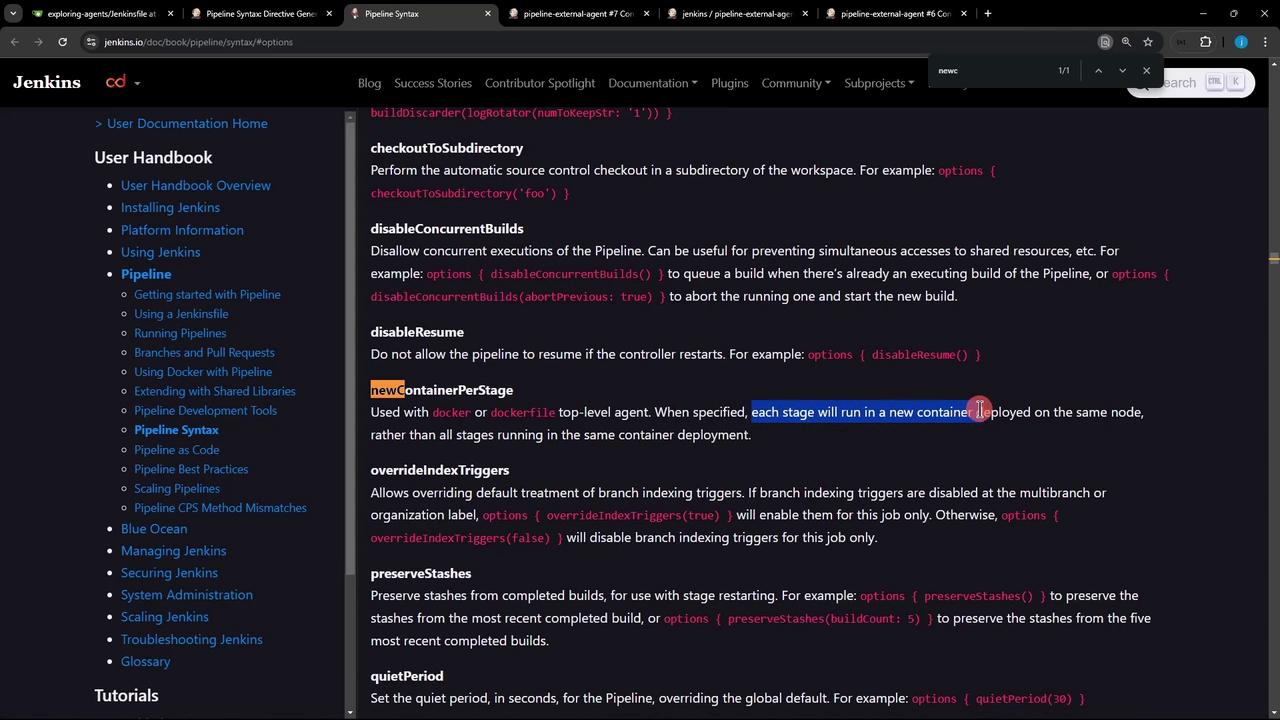Certified Jenkins Engineer
Agents and Nodes in Jenkins
Demo Utilize newContainerPerStage
In this guide, we’ll explore how to leverage the newContainerPerStage() option to control container lifecycle in a Jenkins Declarative Pipeline. By default, a top-level dockerfile agent builds one container and reuses it across all stages. With newContainerPerStage(), each stage runs in its own fresh container—ensuring clean, isolated environments.
Pipeline Strategies Overview
| Approach | Description | Pros | Cons |
|---|---|---|---|
| Stage-Specific Agents | Define an agent for each stage | Fine-grained control | Verbose configuration |
| Single Global Dockerfile Agent | One container built from a Dockerfile | Fast setup, shared workspace | Stateful builds, no isolation |
| Shared Workspace Across Stages | Persist files and workspace in one container | Easy data sharing | Hard to clean up between stages |
newContainerPerStage() Option | Fresh container per stage from same Dockerfile | Clean slate each stage, better QA | No shared files, longer total build |
1. Pipeline with Stage-Specific Agents
Assigning agents at the stage level offers maximum flexibility but can become verbose:
pipeline {
agent any
stages {
stage('S1-Any Agent') {
agent any
steps {
echo "Running on any available agent"
}
}
stage('S2-Ubuntu Agent') {
agent { label 'ubuntu' }
steps {
echo "Running on Ubuntu node"
}
}
stage('S3-Node Image Agent') {
agent { docker { image 'node:18-alpine' } }
steps {
sh 'node -v'
}
}
stage('S4-Dockerfile Agent') {
agent {
dockerfile {
filename 'Dockerfile.cowsay'
label 'ubuntu-docker-jdk17-node20'
}
}
steps {
sh 'node -v'
}
}
}
}
2. Single Global Dockerfile Agent
Simplify the pipeline by declaring one global Dockerfile agent. All stages execute in the same container built from Dockerfile.cowsay:
pipeline {
agent {
dockerfile {
filename 'Dockerfile.cowsay'
label 'ubuntu-docker-jdk17-node20'
}
}
stages {
stage('Stage-1') {
steps {
sh 'cat /etc/os-release'
sh 'node -v'
sh 'npm -v'
}
}
stage('Stage-2') {
steps {
sh 'cat /etc/os-release'
sh 'node -v'
sh 'npm -v'
}
}
stage('Stage-3') {
steps {
echo "Custom build steps..."
}
}
stage('Stage-4') {
steps {
sh 'node -v'
sh 'npm -v'
sh 'cowsay -f dragon "This is running on Docker Container"'
}
}
}
}
Jenkins will:
- Build the Docker image:
#1 FROM docker.io/library/node:18-alpine #5 RUN apk update && apk add --no-cache git perl && \ cd /tmp && git clone https://github.com/jasonm23/cowsay.git && cd cowsay ; - Launch a single container.
- Run each
shstep inside that container. - Tear down the container after pipeline completion.
3. Sharing State Across Stages
Because the container and workspace persist, you can create files in one stage and consume them later:
pipeline {
agent {
dockerfile { filename 'Dockerfile.cowsay' }
}
stages {
stage('Stage-1') {
steps {
echo "Generating a random file"
sh 'echo $((RANDOM)) > /tmp/imp-file-$BUILD_ID'
sh 'ls -l /tmp/imp-file-$BUILD_ID'
sh 'cat /tmp/imp-file-$BUILD_ID'
}
}
stage('Stage-2') {
steps {
echo "Reading the same file in Stage-2"
sh 'ls -l /tmp/imp-file-$BUILD_ID'
sh 'cat /tmp/imp-file-$BUILD_ID'
}
}
stage('Stage-3') {
steps {
echo "Verifying file in Stage-3"
sh 'cat /tmp/imp-file-$BUILD_ID'
}
}
stage('Stage-4') {
steps {
echo "Inspecting before exit"
sh 'ls -l /tmp/imp-file-$BUILD_ID'
sh 'cat /tmp/imp-file-$BUILD_ID'
echo "Sleeping to keep container alive"
sh 'sleep 120s'
}
}
}
}
Note
With a single container, workspace contents persist across stages—ideal for sharing build artifacts or test reports.
4. Isolating Stages with newContainerPerStage()
To enforce a clean container per stage (and thus no shared workspace), enable the newContainerPerStage() pipeline option:
pipeline {
agent {
dockerfile { filename 'Dockerfile.cowsay' }
}
options {
newContainerPerStage()
}
stages {
stage('Stage-1') {
steps {
echo "Stage-1: create file"
sh 'echo $((RANDOM)) > /tmp/imp-file-$BUILD_ID'
sh 'ls -l /tmp/imp-file-$BUILD_ID'
sh 'cat /tmp/imp-file-$BUILD_ID'
}
}
stage('Stage-2') {
steps {
echo "Stage-2: cannot access file from Stage-1"
sh 'ls -l /tmp/imp-file-$BUILD_ID'
sh 'cat /tmp/imp-file-$BUILD_ID'
}
}
}
}
Warning
With newContainerPerStage(), each stage builds its own image and launches a separate container. Files created in one stage will not be available in subsequent stages.

For detailed syntax, refer to the Jenkins Pipeline options section.
Links and References
Watch Video
Watch video content
Practice Lab
Practice lab